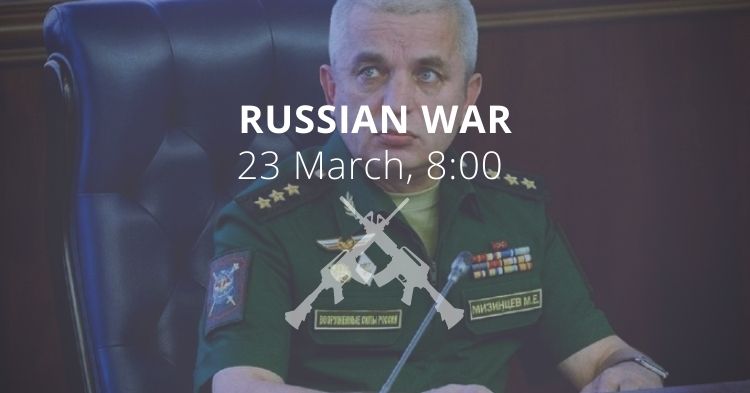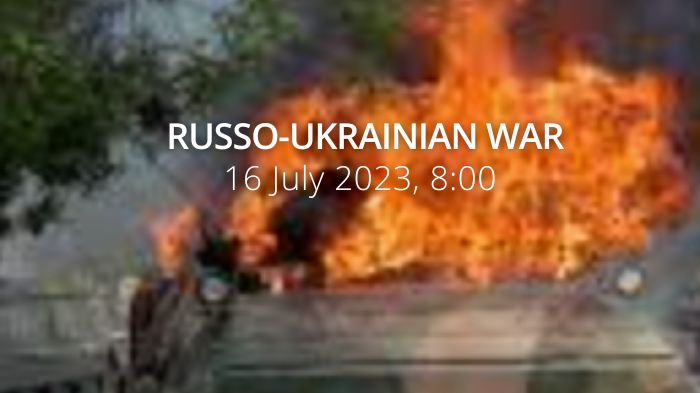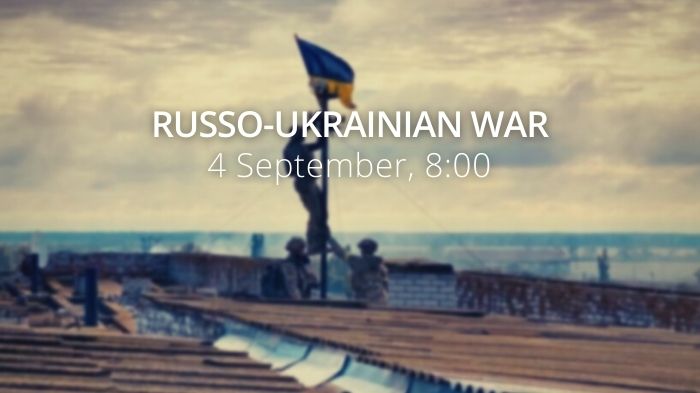Morning report day 28 – March 23
The report is based on media reports, expert analyses and official information posted online.
Situation
According to information from the General Staff as of 18.00 23.03.2022, supplemented by its [noon assessment]:
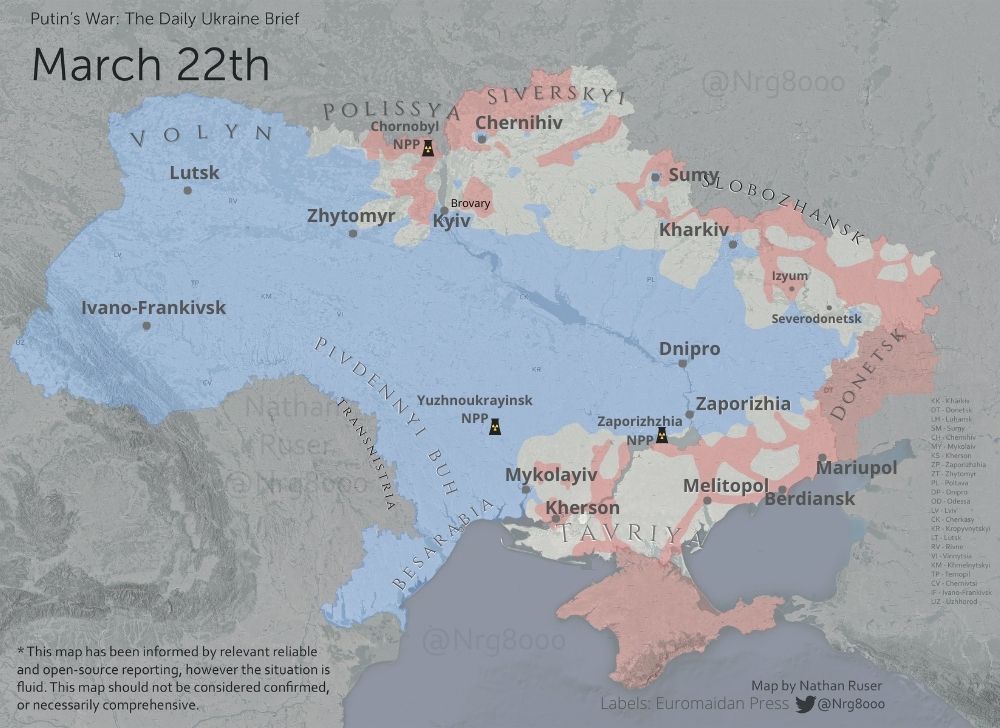
[Ukraine’s Armed Forces, in close cooperation with other defence service units, continue to hold down the occupied frontiers, carry out reconnaissance of the enemy in all directions of its advances, and fire back with all forces and means.]
The [Ukrainian] defence forces continue to conduct a defence operation in the Eastern, Southern, and Northeastern directions.
In the North-Eastern direction, the defence operation continues in a designated operational zone. The main efforts are focused on covering the state border, holding back the enemy’s offence in the area of Malyn.
In the Siversky region, a group of troops holds the defence of Chernihiv and holds back the advancement of the enemy in the direction of Kyiv.
[Thus, in the Donetsk and Luhansk directions, the enemy has attempted to move forward and secure their position but had no success.]
In the Eastern direction, the operational groups of troops are operating in the Donetsk, Slobozhansk, and Eastern part of the Tavriya operational districts. They are not allowing the enemy an opportunity to renew their offence in the directions of Slov’yansk and, part of the forces, on the Lozova locality. They are restraining the advances of the enemy in the direction of Zaporizhya.
The combined forces are holding back the invader in the direction of the cities of Popasna and Kurakhove. They are also carrying out the circular defence of Mariupol.
[The military-political leadership of the Republic of Belarus continues the provide comprehensive support to the enemy’s military, by giving it the use of its airfield and transport network, certain healthcare facilities, and is acting as an accomplice in crimes against the Ukrainian people.]
In the South-East direction a defence operation is being carried out, as well as the support of troops’ ground operations and individual units, and the defence of bases and seaports in the Black Sea operational zone. The defence of the city of Mykolaiv and Mykolaiv oblast continues.
Our defenders are holding back the enemy in the direction of Kryviy Rih and Novovorontsovska, conducting a stabilising operation, and carrying out territorial defence tasks.
The Air Force and Armed Forces of Ukraine are repulsing concentrated missile and airstrikes of the enemy, covering important objects in Ukraine from the air, and grouping troops. Over the past 24 hours over 17 of the enemy’s air targets have been hit (6 aircraft, 5 UAVs, 1 helicopter and 5 cruise missiles). Additionally, the aviation of the Air Forces have made devastating blows to the accumulation of equipment and manpower of the enemy, and have damaged the enemy’s cruise missiles.
[At the same time, there is the possibility of involving the armed forces of the Republic of Belarus in the war against Ukraine on the side of the Russian Federation. However, according to the information available, a large number of personnel as well as some commanders are refusing to participate in the occupation of our state.]
On the territory of Belarus the representatives of the opposition forces and concerned citizens who condemn the assistance of the current illegitimate government of the Russian Federation in the war with Ukraine, have partially disrupted the railway connection between the republic of Belarus and Ukraine. Information to be confirmed.
At the same time, based on the available information, Russian and Belarusian military equipment is being actively moved across the territory of the Republic of Belarus, and further accumulated along the Ukrainian border.
In certain areas, the enemy has been demoralised. Thus, during the storming of the city of Mariupol, in one of the special forces units that were involved in active hostilities, less than 10% of the personnel are prepared to continue to take part in the war, and the remaining personnel are either killed, wounded, ill, or demoralised.
On the territory of the Russian Federation, covert mobilisation continues, to replenish the personnel losses in the occupying group of troops operating on the territory of Ukraine. Military commissariats are making efforts to attract former servicemen to serve and sign the relevant contracts of former servicemen, and preference is given to those with combat experience. ”
On Tuesday, the General Staff reported that:
In the Black Sea and Azov operational zones, the ships of the Russian Navy perform tasks in certain areas of the Black Sea. Up to 5 ships of various types continue to be stationed in the North-Eastern part of the Sea of Azov to support the actions of the ground forces of the occupying forces.
Cases of mass refusal of servicemen of the Armed Forces of the Russian Federation to take part in the war against Ukraine continue to be recorded. According to the available information, in the 155th separate brigade of marines since the beginning of the war about 220 servicemen refused to take part in the armed aggression against Ukraine. In total, since February 24 this year, about 50 servicemen have been killed and about 110 wounded. Also, the death of senior officers in the Russian-Ukrainian war has caused a great resonance in Russian society.
The enemy, as noted earlier, has significant problems with the logistics of occupying forces in almost all directions. In addition, the occupying forces continue to suffer significant losses due to an inadequately organized medical supply system. Thus, due to untimely provision of medical care, lack of medical evacuation of the wounded and lack of medicines, units of the 7th Assault Division of the Airborne Forces of the Armed Forces of the Russian Federation suffered heavy losses.
The Odesa Military Administration has reported that the siege of Mariupol, in which Russian troops committed war crimes such as bombing the maternity hospital, drama theater, and civilian houses, is being led by General Mikhail Mizintsev, who led Russia’s operation in Syria, where Russia also committed war crimes and destroyed civilian infrastructure.
Mariupol siege is led by Gen.Mikhail Mizintsev, who led the operation in Syria
He ordered to bomb the maternity hospital, children's hospital, drama theater, civilian houses. "He is destroying Mariupol as he used to destroy Syrian cities,"–Odesa Mil.Admin https://t.co/n7D0USpKov pic.twitter.com/WMr2p7WhKI
— Euromaidan Press (@EuromaidanPress) March 22, 2022
Periodically, warships attack the city of Odesa and along the Ukrainian coast with rocket and artillery, the Centre for Defence Strategies reports. On March 22, Odesa and surrounding areas were attacked by enemy missiles at least three times, including from Crimea.
A Russian serviceman allegedly surrendered his tank to Ukraine after Kyiv offers a $10,000 reward and citizenship prospects, Interfax reports. He handed over his fully operable tank to the Ukrainian forces after seeing in his phone a targeted text with the Ukrainian government’s offer that guaranteed safety, a financial reward, as well as potential Ukrainian citizenship once the war is over.
Russian occupier handed in the tank for reward, Advisor to the Minister of Internal Affairs Victor Andrusiv reports.
He was paid $ 10,000 and given a chance to apply for Ukrainian nationality after the war.https://t.co/ktna1ZnZ2z pic.twitter.com/GzI3iv3wFw— Euromaidan Press (@EuromaidanPress) March 22, 2022
The Russian forces are acting very cautiously with regard to the gas transport infrastructure in Ukraine, Yuriy Vitrenko, chairman of Naftogaz of Ukraine, said, Interfax reports.
“Therefore, it’s obvious to us that they don’t want to cause damage to their own commercial interests and their commercial relations, he said. Vitrenko reaffirmed that Kyiv currently remains fully in control of the gas transport process, and Gazprom is utilizing the contracted facilities.”
According to British Defence Intelligence, (last 24 hours):
- The battlefield across northern Ukraine remains largely static with Russian forces likely conducting a period of reorganisation before resuming large-scale offensive operations.
- Russian forces are attempting to envelop Ukrainian forces in the east of the country as they advance from the direction of Kharkiv in the north and Mariupol in the south.
- Russian forces are still attempting to circumvent Mykolaiv as they look drive west towards Odesa.
- The Ukrainian civilian population in Russian-occupied cities continues to protest against Russian control.
- Russian efforts to subdue the population by manipulating the media, spreading propaganda and installing puppets, pro-Kremlin, leaders have so far failed.
- Russia will probably respond to these failures by employing increasingly violent and coercive measures in an attempt to suppress the Ukrainian population.
As of Wednesday 23.03.2022, the approximate losses of weapons and military equipment of the Russian Armed Forces from the beginning of the war to the present day:
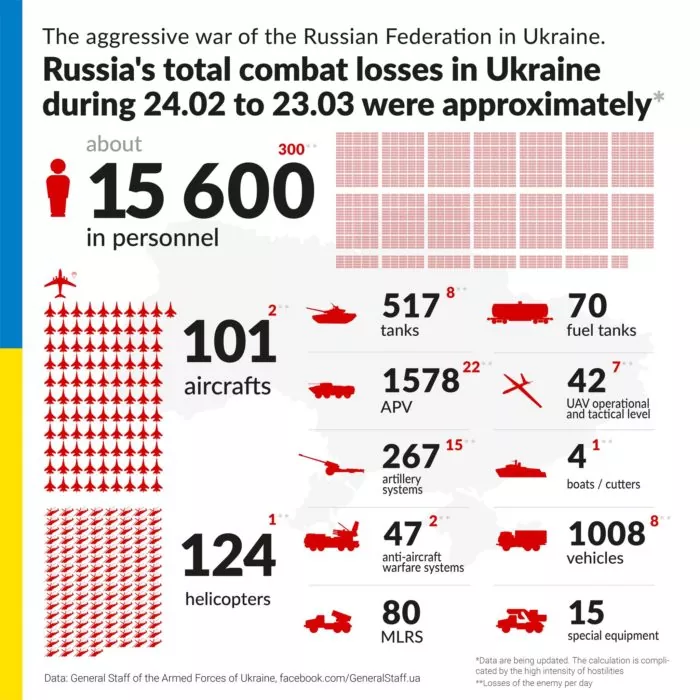
- personnel – more than 15,600 people (+300),
- tanks – 517 units (+8),
- armoured combat vehicles – 1578 units (+22),
- artillery systems – 267 (+15),
- multiple rocket launchers – 80 (no change),
- air defence means – 47 (+2),
- aircraft – 101 (+2),
- helicopters – 124 (+1),
- vehicles – 1008 (+8),
- light speedboats – 3 units (no change),
- fuel and lubricant tanks – 70 (no change),
- UAV operational and tactical level – 42 (+7)
- Special equipment – 15 (no change)
According to ArmyInform, the information agency of the Ukrainian Army, Russia’s losses in Ukraine over 26 days have exceeded the USSR’s toll over the 10 years of the war in Afghanistan.
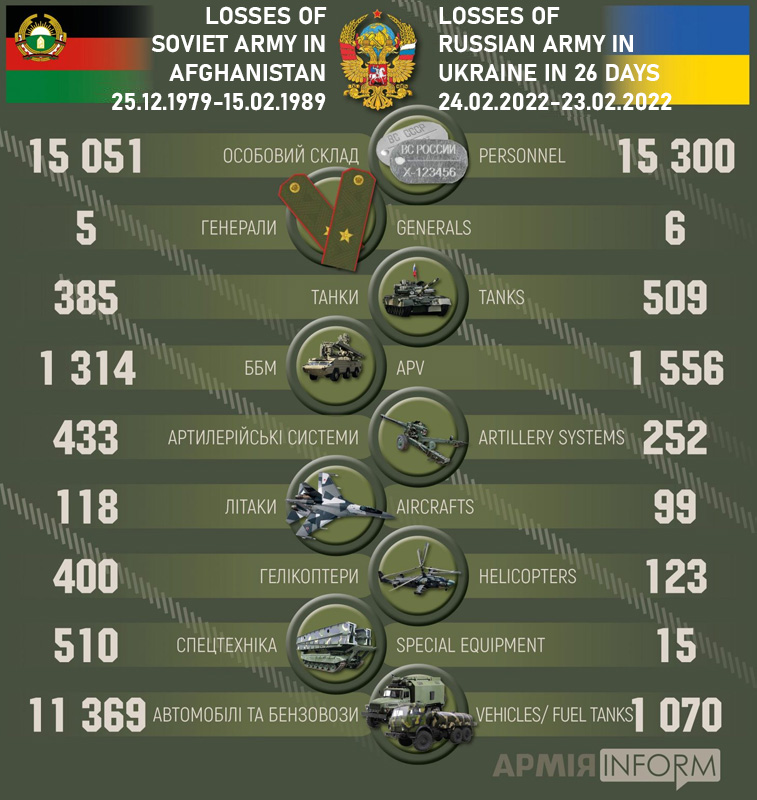
Humanitarian
According to UNHCR 3,557,245 refugees has been registered as of 21 March.
The UN says that so far Poland has taken in 2,113,554 refugees, Romania 543,308, Moldova 367,913, Hungary 317,863, Slovakia 253,592, Russia 252,376 and Belarus 4,308.
As of 8 a.m. on March 22, 2022, since the beginning of the Russian invasion of Ukraine, 117 children have been killed and 155 injured. It is not possible to establish the actual number of dead and wounded children due to ongoing fighting in Ukrainian cities.
Representatives of the so-called “DNR” seized an evacuation column with Ukrainian State Emergency Services officers on an agreed route near Mariupol, Ukrainska Pravda reported Tuesday evening.
“Iryna Vereshchuk: “Today there is a convoy of buses on the corridor we tried to open again, there are SES officers who were seized by DNR representatives. They are standing near Mangush. We are trying to get them out with all our might.”
According to the Center for Defense Strategies, yesterday,
representatives is unknown. The occupants fired at evacuation buses with children from Mariupol. Four children were taken to the hospital; two children remain in serious condition. […]
Nevertheless, 1,100 Mariupol residents were evacuated from Berdiansk. Almost 6,000 Mariupol residents reached Zaporizhzhia by their own transport. Ukrzaliznytsia (Ukrainian railroad) managed to evacuate about 1,000 more Mariupol residents who are currently on their way to Lviv and Kovel. It is currently impossible to create a sizeable humanitarian corridor in the Chernihiv Oblast due to the danger of Russian forces shelling civilian evacuation. Chernihiv is on the verge of survival (according to Ombudsman Lyudmila Denisova). Currently, the city’s outskirts are bombed, the suburbs are destroyed by 60%. Chernihiv residents are without water and electricity.
Legal
The vast majority of enemy shelling falls on civilian infrastructure, according to Deputy Head of the State Emergency Service of Ukraine Roman Primush. 90% of Russian shelling “is carried out on non-military targets. We make 200 trips a day for such cases. Most rescuers are involved in Donetsk, Luhansk, Kharkiv regions, as well as in the cities of Kyiv and Kharkiv.”
Bombings and shelling damaged 548 educational facilities, 72 of which were completely destroyed.
At least 62 healthcare facilities have been hit in Ukraine as of March 18, the World Health Organization said Tuesday, the Washington Post reports. Fifteen people were killed and 37 injured in the attacks since February 24, the organization said. “Attacks on health care violate international law and endanger lives,” the WHO said in an email. Even in times of conflict, we must protect the sanctity and safety of health care, a fundamental human right.”
According to the General Staff of Ukraine:
- Russia continues to carry out artillery shelling and rocket attacks of residential neighbourhoods, historic architectural sites, schools, hospitals, and civilian industries.
- In towns and villages that peacefully resist the occupants’ armed forces, they resort to looting and violence against civilians.
Last week, President Biden described President Vladimir Putin as “a war criminal” for ordering attacks on innocent civilians in Ukraine. For Syrians, Biden’s comments are welcome but about seven years too late, considering that the Russian military has been committing war crimes there (in collaboration with Bashar al-Assad’s regime) since 2015, Josh Rogin writes in Washington Post. “Perhaps if the world had held Putin accountable then, he wouldn’t be committing war crimes in Ukraine now.”
Environmental
In a speech by video link, President Zelensky warned Italy’s Parliament on Tuesday that “famine was approaching for several countries” that depended on Ukrainian corn, oil and wheat, including Italy’s “neighbours across the sea,” referring to some North African nations, The New York Times reports.
“How can we sow under the strikes of Russian artillery? How can we cultivate when our enemy destroys our fields and our fuel?”
Forest fires broke out around the Chernobyl nuclear site Monday, raising fears that radiation could spread from the crippled facility, the Washington Post reports. Ukraine’s minister of natural resources later told the Associated Press that the fires had been extinguished, easing the immediate alarm.
“At least seven fires within the plant’s exclusion zone had been observed on satellite imagery from the European Space Agency, the parliament said in a statement. […] Ukrainian officials and firefighters could not carry out their usual functions in the area to extinguish the fires because of Russian control of the plant, the update added. It also warned that fires within “a 10-kilometre radius” [6.2 miles] of significant radioactive waste and contamination could pose a “particular danger.” Nuclear energy experts said the fires could also threaten critical electricity transmission lines, which had been recently repaired. “The facilities themselves’ greatest vulnerability is a loss of power,” said Edwin Lyman, director of nuclear power safety at the Union of Concerned Scientists.”
Support
Italian Prime Minister Mario Draghi said that Italy wants Ukraine to join the European Union, Interfax reports. He stressed that […] Italy admired the courage, determination and patriotism […] of the citizens of Ukraine.
“Today, Ukraine is not just defending itself. It is defending our peace, our freedom, our security. It is defending this multilateral order based on the rules and rights that we painstakingly created after the war.”
European Union leaders are set to agree this week on an international fund to help finance the reconstruction of Ukraine from the destruction wrought by the Russian invasion, a draft of their summit statement showed, Reuters reports.
“Bearing in mind the destruction and enormous losses brought upon Ukraine by Russia’s military aggression, the European Union is committed to providing support to the Ukrainian Government for its immediate needs and, once the Russian onslaught has ceased, for the reconstruction of a democratic Ukraine,” the leaders will say following a summit on Mar. 24-25, according to a draft summit statement seen by Reuters. […] Some EU politicians have called for the use of Russian assets frozen by the West, including some $300 billion of Russian central bank reserves, as reconstruction money for Ukraine once the aggression ends.”
About 355,000 have returned to Ukraine since February 24, Ukrainian State Border Guard Service reported 22 March.
New developments
- Negotiations are still ongoing. Dmitry Peskov, the press secretary of the President of the Russian Federation, told reporters on Tuesday that making the substance of the negotiations public can only damage the negotiation process, which is already going much slower and less meaningful than Kremlin would like, TASS reports. The demands of the Russian Federation are well known to the Ukrainian side and all the necessary draft documents were handed over to Ukraine quite a few days ago, indicating that Russia’s position has not moved.
- UN Secretary-General Antonio Guterres on Tuesday urged an end to the “absurd war”, warning that the conflict is “going nowhere, fast” and that the Ukrainian people are “enduring a living hell”, Reuters reports. “Continuing the war in Ukraine is morally unacceptable, politically indefensible and militarily nonsensical,” Guterres told reporters in New York.
- Russia has requested a vote in the UN Security Council on a resolution regarding Ukraine. According to TASS, Russia has asked for a March 23 vote in the UN Security Council on its draft resolution related to the humanitarian situation in Ukraine. The draft resolution proposes a ceasefire for the evacuation of all civilians, ensuring the protection of the civilian population and civilian objects. The document also calls for funding for the UN’s humanitarian response program.
- President Zelenskyy would welcome Pope Francis and his role as a mediator in the war with Russia, he announced Tuesday, The Hill reports.
- Moscow has terminated peace treaty talks with Tokyo in light of unilateral restrictions imposed by Japan against Russia over Ukraine, TASS reports. “Tokyo expressed its protest to Russia’s Ambassador to Japan Mikhail Galuzin over Moscow’s decision to abandon peace treaty talks, Japan’s Foreign Minister Yoshimasa Hayashi told reporters on Tuesday.”
- It is “clear” that Russia is considering the use of chemical and biological weapons in Ukraine, US President Joe Biden said Monday and warned of a “severe” Western response if it chose to do so France24 reports.
- EU Foreign ministers have reached a political agreement to give Ukraine another €500 million in arms and military equipment following a meeting in Brussels on Monday, Euronews reports. “The bloc’s top diplomat, Josep Borrell, reaffirmed the bloc’s unity against Russia, committing to continue all kinds of support to the embattled country, including financial, humanitarian and military support. Member states also formally approved the EU’s plan to boost its security and defence by 2030 known as the Strategic Compass.”
Assessment
The Institute for the Study of War has made the following assessment as of Tuesday 22 March:
Nor is the outcome of the war yet clear. The Russians might still win; the Ukrainians might win; the war might expand to involve other countries; or it might turn into a larger-scale version of the stalemate in Ukraine’s east that had persisted from 2014 to the start of Russia’s invasion in February 2022. The failure of Russia’s initial military campaign nevertheless marks an important inflection that has implications for the development and execution of Western military, economic, and political strategies.
The West must continue supplying Ukraine with the weapons it needs to fight, but it must now also expand its aid dramatically to help keep Ukraine alive as a country even in conditions of stalemate. […]
A campaign is a major military undertaking launched as part of a war effort to achieve one or more objectives that are necessary but not necessarily sufficient to achieving the overall war aims. The Russian invasion of Ukraine that began nearly a month ago was such an undertaking—its aims of seizing Kyiv and Ukraine’s other major cities were part of a larger effort to replace the government of Ukraine, destroy the Ukrainian military, and allow Russian President Vladimir Putin to set political, economic, and security conditions in Ukrainian territory to his liking.
It is useful to compare Putin’s initial campaign with the German invasion of the Soviet Union (USSR) that began in June 1941. The German objectives were to seize Leningrad (today’s St. Petersburg), Moscow, and Ukraine to knock the USSR out of the war quickly. The Germans destroyed huge portions of the Soviet military, besieged Leningrad, reached the outskirts of Moscow, and then the campaign culminated in winter 1941. Like the Russians in Ukraine today, the Germans in 1941 continued to try to get more combat power to the front and launch increasingly hopeless attacks against Moscow well past the point of diminishing returns—which is one sign that a campaign has culminated. The Germans failed to take any of their objectives.
The German campaign culminated with Leningrad besieged, though, and it remained besieged for nearly 900 days. But the 1941 campaign was unquestionably defeated, the Germans went over to the defence, the Soviets launched a counter-offensive, and then the Germans launched a new campaign in 1942 that culminated at Stalingrad. Leningrad remained besieged the entire time. So a campaign can end with a major city (much larger than Mariupol, for example) besieged, the war not over, both sides fighting, and yet the campaign can have failed. That’s the situation the Russians now likely face in Ukraine. […]
Stalemate describes a condition in war in which neither side can change the front lines dramatically no matter how hard it tries. […] World War I epitomized stalemate. Stalemate in that conflict, as in others, saw lots of very hard and nasty fighting with many casualties on both sides. The front lines became generally (but not completely) static, with very little movement. […]
But stalemate often involves large and bloody battles. […] And stalemates can ultimately be broken, as the one in World War I eventually was. One side or the other can lose its will. One side or the other can gain a new ally (like the US in World War I). One side or the other can gain a technological advantage, although that’s less common […]. One side or the other can just be ground down and collapse (like Russia in 1917). Many things can happen in the context of a huge amount of fighting and dying, all in conditions of stalemate. That is the most likely course of action we see in Ukraine right now.
Our assessment that the Russian campaign has culminated and that conditions of stalemate are emerging rests on our assessments, laid out carefully in many fully documented reports published on our website (not just maps) and increasingly validated by reports from various Western intelligence communities, that the Russians do not have the capability to bring a lot of fresh effective combat power to the fight in a short period of time. The kinds of mobilizations the Russians are engaging in will generate renewed fighting power in months at the earliest. Unless something remarkable happens to break the stalemate now settling in, the stalemate is likely to last for months. Hence our assessment and our forecast. […]
We published our assessment that this Russian campaign has culminated because it has important, urgent implications for Western policy. If our assessment is correct, then the West must increase efforts to supply Ukraine with all the materials it will need to survive as a country and continue fighting during conditions of stalemate and siege, which will be brutal. The West will have to help Ukraine stabilize a functioning economy in its unoccupied territory that can survive even under constant Russian attack. It will have to move beyond the appropriately rushed effort to get specific high-end defensive systems to Ukrainian soldiers and think about the bigger problem of keeping Ukraine and Ukrainians alive during a long war.”

